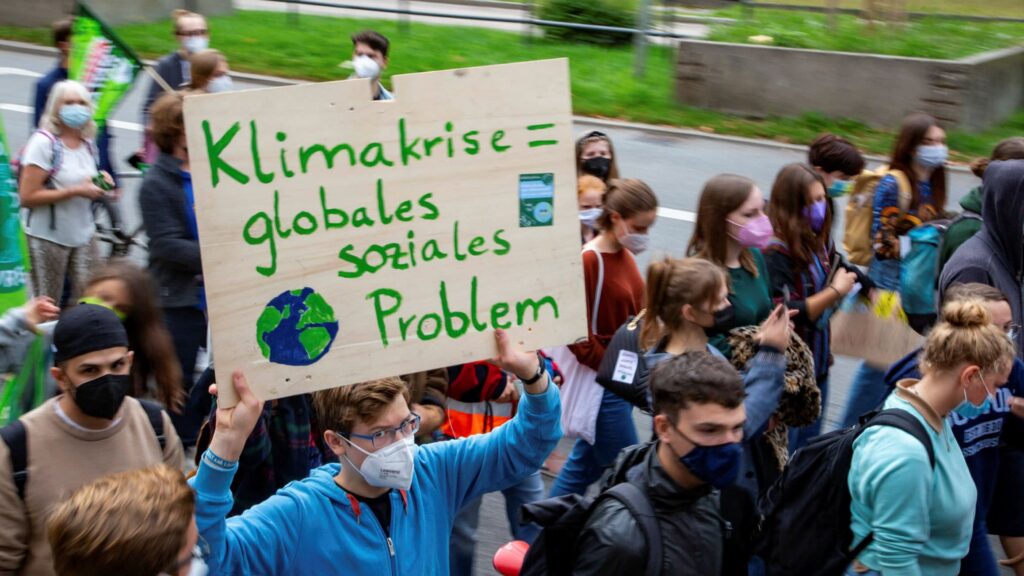Germany’s climate change gulf gets harder to bridge


Climate change updates
Sign up to myFT Daily Digest to be the first to know about Climate change news.
When her turn came at an election event last week, Paula Krüger, a bespectacled teenager in a tangle of necklaces, got straight to the point: How, she asked, could the candidate justify policies that wouldn’t meet Germany’s international climate obligations?
She was not confronting the centre-right leader of the Christian Democrats, Armin Laschet, nor the Social Democrat, Olaf Scholz, whose climate targets activists shun as equally unambitious. The challenge was to Annalena Baerbock, candidate for Germany’s Greens.
Anyone surprised by this has missed the signals from a younger generation increasingly fed up with German politics.
This weekend’s momentous election will decide Germany’s new course after 16 years led by Angela Merkel. Climate change motivates a majority of young German voters, to the point that many feel the Green Party does not go far enough.
A newsurvey of 10,000 young people from 10 different countries may explain why: it found 60 per cent fear for their future. Some 56 per cent believe humanity is doomed.
“I have some days where it feels paralysing. I can’t go to class, I can’t even go to protests. I feel scared everything will fail,” Pauline Brünger, a 19-year-old Fridays for Future activist from Cologne tells me. We met to discuss the devastating summer floods in Germany, and why it has not spurred stronger demands for climate action.
Fridays for Future activists dispute the idea of generations at war, but the numbers almost make it one: voters under 30 are only 14.4 per cent of the electorate. Over 50s make up 57.8 per cent, but less than a third of them say the impact of climate change on the young affects their vote.
“This isn’t a conflict of generations, it is a conflict of power,” Fridays for Future activist Line Niedeggen tells me. “The question is how we redistribute that power.”
They will try to claim some power — at least over public opinion — with a nationwide pre-election climate strike on Friday.
What Line’s mother, Barbara, thought would be occasional gatherings to paint posters and protest has morphed into something far more serious. The young activists adopted a professionalism in their constant online meetings that Barbara, laughing, said her own coworkers struggled for far longer to master. “I am amazed, not just at the enthusiasm, but the discipline of these children — well, ‘children’,” she says with air quotes.
But while young people like Line channel their frustrations into activism, many more fall into segments that a study by More in Common calls “The Disillusioned” and “The Detached” — nearly half of voters under 30 expressed disappointment with democratic institutions that the NGO says could strain German democracy.
If this election is anything to go by, young Germans’ dissatisfaction at how politicians address their concerns may be well founded.
Willy Schulz, a 26-year-old from the flood-stricken Ahr Valley, was still getting over regular nightmares after surviving the deluge when he went to a town hall this month for the CDU candidate, Laschet.
He is not a climate activist, nor a Green party member, but the floods have shaken him. He had a simple question: why trust Merkel’s party, after years of relative inaction on climate change? At one point, Laschet told him to “pipe down”.
“I was hoping he would offer his ideas on how to fight climate change, but instead he just blamed other parties and defended his party,” he told me later. “It felt almost Trumpian.”
Just outside the Bundestag, a few protesters with more extreme demands for attention have set up green and white tents. Calling themselves the “last generation”, six are on hunger strike. They want to speak with the candidates for chancellor before elections but the demand remains unmet. One has been hospitalised.
Many youth activists worry that some in their ranks could split, embracing more radical forms of civil disobedience. “We’ve had three years of Fridays for Future, and decades of environmental protests,” Line told me. “People are already thinking: Well, what do we do now?”